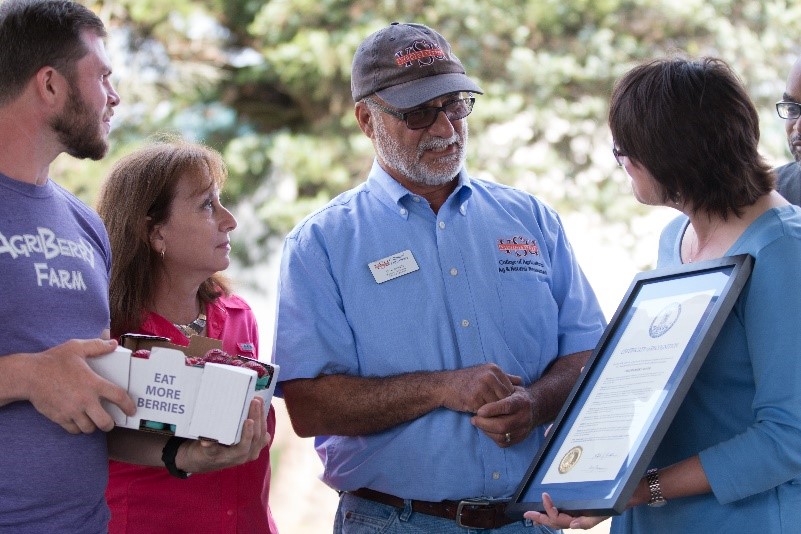Priority 6: Enhance the Land Grant Mission of the University
Our goal is to elevate the Agricultural Research, Cooperative Extension Operations and Agricultural Academic Areas to carry out the land-grant mission for the University throughout the community, the Commonwealth, nationally and globally.

As part of VSU’s land-grant mission, the College of Agriculture also houses the Virginia Cooperative Extension program and an Agricultural Research Station, each which provide valuable resources to Virginia residents, while also providing practical, hands-on internship and work study opportunities for our students.
Priority 6 Objectives:
Expand and strengthen the academic opportunities
Strategic Actions
- Foster the integration and utilization of Randolph Farm with the College of Agriculture
- Establish Virginia State University as the Commonwealth’s Center for Agricultural Teacher Education
- Expand opportunities for VSU student participation in both undergraduate and graduate education internationally via Agricultural Research and Cooperative Extension
Create and conduct national and international agricultural research programs
Strategic Actions
- Incentivize faculty to obtain additional grant funding opportunities to add capacity within the College of Agriculture
- Evaluate and modify existing indirect cost plans to maximize funding from grants for the College of Agriculture
- Expand College of Agriculture and campus engagement/participation in research associated with nutrition and public health
- Accelerate development of novel and alternative technologies for processing and packaging that improve the value, quality and safety of food
- Expand research opportunities and experimentation into increased production and utilization of renewable biofuels which can provide microeconomic benefits for urban and rural sectors alike
- Increase the probability of higher incomes for farmers through adoption of potentially-profitable alternative crops such as edamame (vegetable soybean), industrial hemp, hops, flax, chickpea, sorghum and teff
- Accelerate the dissemination of research-based information to expand sustainable forage based small-ruminant production in Virginia
- Increase research opportunities to protect the environment and natural resources
- Establish a Center of Excellence to support water and quality of life for rural Virginians
Expand the programmatic footprint of VSU Cooperative Extension within Virginia Cooperative Extension, as well as Increase University/corporate partnerships and collaborations
Strategic Actions
- Develop and implement a vibrant Cooperative Extension program that supports Agriculture and STEM (Science, Technology, Engineering, and Mathematics) initiatives at VSU
- Create a “Healthy Lifestyles” collaborative encompassing Cooperative Extension, Agricultural Research and select VSU Colleges focused on the amelioration of health disparities
- Expand the VSU Cooperative Extension’s ongoing program efforts in the arena of “Sustainable Families and Communities” via the development of strong partnerships and collaborations with federal and state agencies
- Create and deploy four (4) full-time positions within Cooperative Extension; inclusive of food safety, water quality, urban agriculture and forestry, and wildlife to further expand VSU role relative to outreach and engagement
Expand university/corporate partnerships and collaboration
Strategic Actions
- Review the function and organizational structure of the Center of Agricultural Research and Engagement to enhance its impact on the land-grant mission
- Create relevant partnerships with private-sector companies and organizations to assist with and facilitate research, educational, employment, and developmental needs
- Forge new markets for small farmers via joint/dual venture capital enterprise development opportunities
- Actively engage the College of Agriculture Advisory Committee and stakeholders in program development and implementation
Enhance and expand the infrastructure and technological capability of facilities within the College of Agriculture, both on and off campus
Strategic Actions
- Upgrade and improve upon the physical infrastructure of existing facilities while building new facilities; which support and expand the academic, research and extension missions of the College
- Promote interdisciplinary learning, research and engagement via a world-class collaborative platform optimizing building space utilization; faculty engagement and idea exchange in student learning; and the expansion of student experiential learning per internships and/or volunteer hours at Randolph Farm
- Upgrade technologies and technological infrastructure of College of Agriculture facilities in furtherance of improve administrative operations; student learning via smart technologies; and enhanced branding, marketing and communication efforts to external stakeholders and publics